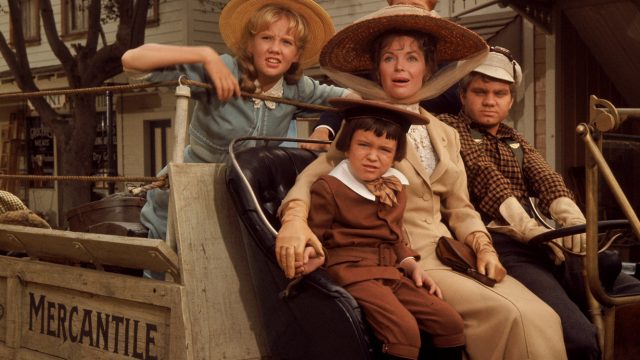There are a few movies that it’s just not summer unless I see them at least once. This isn’t just my traditional annual viewing of 1776 for Independence Day. This is, “Oh, it’s hot. I should watch Hayley Mills in rural Maine.” Which, you know, there are worse things to watch. The weird thing is that it doesn’t ever feel like summer in the movie, not really, and the climax is set during the fall. On Halloween, in fact. Still, you know, here we are. On a miserably hot and humid day, watching people who seem considerably less uncomfortable than I am despite theoretically wearing wool.
We open with a title card, declaring the place to be Boston and the time to be rag. The Carey family is moving, because Mr. Carey has died. Nancy (Hayley Mills), the daughter, is mooning about and wishing things could be other than they are. The elder boy, Gilly (Eddie Hodges), is despairing at the prospect of losing his friends and music. The younger boy, Peter (Jimmy Mathers, younger brother of Jerry and extremely similar in appearance), is up for whatever. And it turns out that the family friend who’d invested their money screwed them over and lost their money, and they can’t even afford the tiny house they’d originally been planning to move into.
It turns out that Nancy has been in correspondence with one Ossium Popham (Burl Ives), postmaster of the town of Beulah, Maine. Once, years before, they’d been on a vacation there and seen a lovely yellow house. Nancy, posing as her mother, wrote to Osh and asked about the house. He’s now written and said they could move in for very little money indeed. Of course, Nancy has exaggerated the family’s situation a bit, but she and Osh hit it off right away, and he still lets the family move in—and stops charging them, because they’re fixing up the house. Which belongs not to him but to wealthy Tom Hamilton (spoiler), who lives in China. The Careys are also forced to take in a relation, Julia Carey (Deborah Walley).
Nancy comes from a long line of Plucky and Imaginative Girls of the Turn of the Last Century, and she’s one of my favourites. She’s a bit less inclined toward the stupid mistakes from not thinking ahead, and she’s got a temper. Also, she wears pants in several scenes, where it’s practical to wear pants. Gilly’s, one assumes. And she hangs wallpaper and plasters and what have you, because it needs done, and Gilly is really not able to do all that much, being a bit focused on other things. She’s the hardest worker in the family.
The songs are a delight. I’ve always been fond of “Femininity” and “Pink of Perfection,” the funny songs of the piece, and apparently “On the Front Porch” was Robert Sherman’s favourite of his own songs for Disney. Walt wasn’t a fan of “The Ugly Bug Ball,” and indeed neither am I, but it’s a nice, wholesome Burl Ives whimsical number if that’s your sort of thing. It’s also true that the movie sets up its songs a bit more than most, reminding us that this is a time when people actually would gather around a piano and sing—there’s a player piano in the first scene, after all.
This is another one of those places where I came to pop culture a bit backwards. Digby Popham, Osh’s son, is played by Michael J. Pollard. And okay, this is before Bonnie and Clyde by four years, I admit, so perhaps I came across them in the right order after all. But it’s like how the first movie I recognize Bruce Dern in is Support Your Local Sheriff, and that’s really not his image.
Likewise, this is also another of Una Merkel’s great Disney performances, so that’s how I got to know her. Not the original of The Maltese Falcon or 42nd Street or Destry Rides Again. This, where she’s Osh’s wife Mariah, and The Parent Trap, where she’s the entertainingly snarky Verbena. Here, she’s a sour, humourless temperance activist who is constantly seeing the gloomy side. She embodies the old Carlin line that, inside every silver lining, there’s a dark cloud. One wonders how she ended up married to Osh in the first place; it’s kind of like how my grandmother was a funny woman and I never actually heard my grandfather laugh.
Similarly, the character for whom I feel the sorriest is not orphaned Julia, no longer able to live with the family she’d always known and thrust in with cousins who despise her. Nor is it saintly Margaret Carey (Dorothy McGuire), widowed with three children, ruined, and then given yet another mouth to feed in the person of snobbish Julia. It’s quite frankly Lallie Joy Popham (Wendy Turner), doormat of a daughter to Osh and Mariah. Her brother treats her like dirt, her mother walks all over her, and her father doesn’t really bring her out so much as use her as a fan club.
There’s a wry sense of humour to the movie—while Nancy takes herself quite seriously, she is not incapable of spotting the joke in other things and people. She and Gilly bicker, but they are equally likely to team up against things they think need teaming up against, to Julia’s misfortune. Peter’s a good-hearted kid, if a bit dumb and not much use to the story. In a way, this movie is Main Street, USA, brought to the screen. It’s few people’s favourite part of Disneyland, but there would be something a bit off if it weren’t there.

